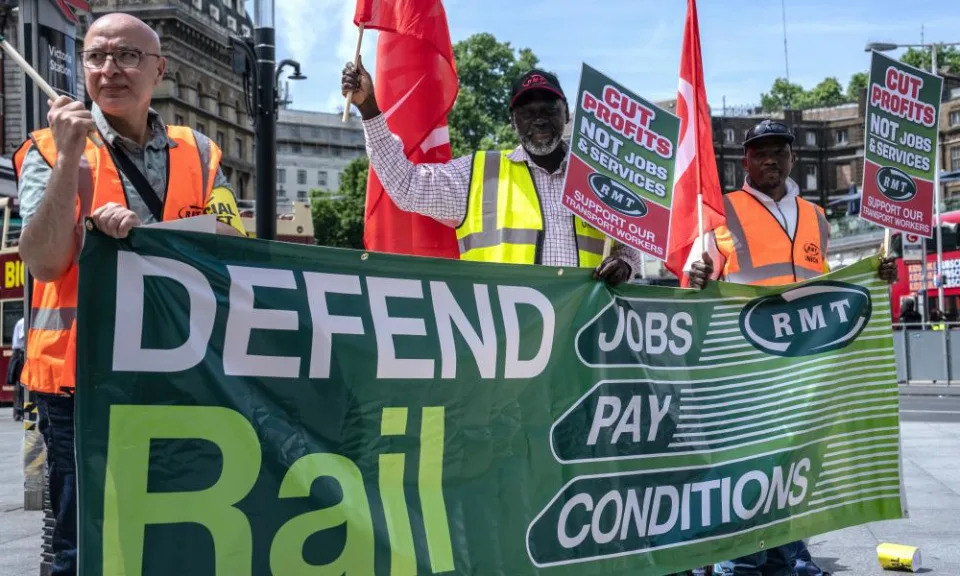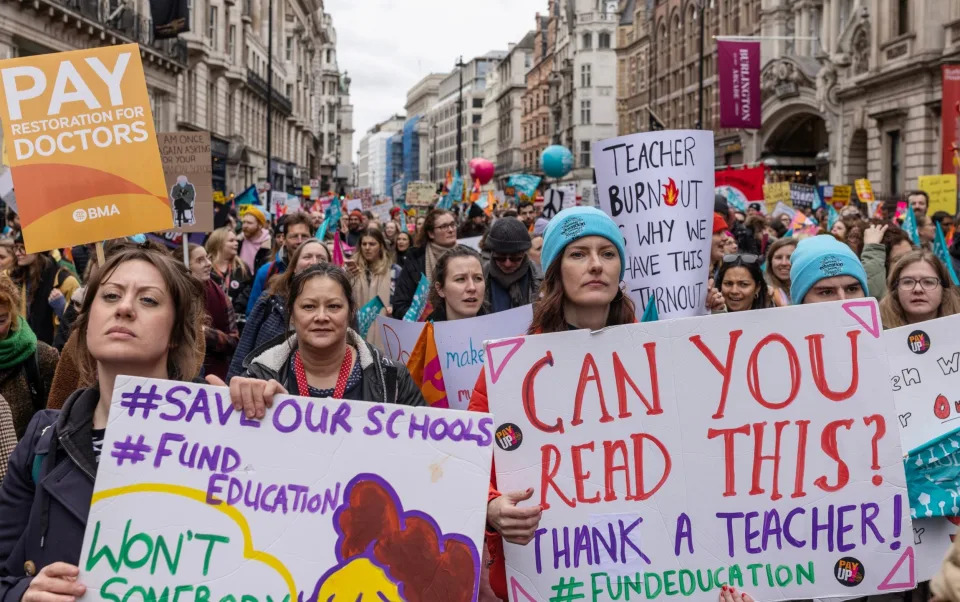Unions vow to carry on fight for better wages and working conditions
Miles Brignall
Sun, 18 June 2023

Photograph: Carl Court/Getty Images
Union leaders have vowed to carry on the fight for better wages and working conditions ahead of the first anniversary of the biggest wave of industrial action seen in Britain for three decades.
This coming Wednesday will mark 12 months since members of the Rail, Maritime and Transport union staged their first stoppage in a dispute over pay, jobs and conditions.
That dispute, which a year on remains unresolved, is regarded by unions as the start of the most significant uprising by UK workers since 1989 – a year with many of the same economic difficulties as today, when interest rates were rising, inflation had surged and demonstrators took to the streets to protest against Margaret Thatcher’s poll tax.
Related: Rail strikes: London to Scotland journeys face disruption in July
Since 21 June 2022, almost every area of the public and private sector has been disrupted by staff battling to ensure their pay keeps place with the fastest rate of inflation since the early 1980s. Barristers, teachers, nurses, junior doctors, university lecturers and civil servants in almost every government department – from driving examiners to rural food inspectors – have all gone on strike.
In the private sector, the GMB union has organised warehouse strikes at Amazon, as staff push for union recognition, and Royal Mail has been repeatedly hit by industrial action, while lorry drivers and factory workers have either joined in the stoppages or threatened to do so.
Over 3.7m working days were lost between June 2022 and April 2023, according to latest available data from the Office for National Statistics, the highest for any 11-month period since May 1990, when 4.8m working days were lost.
On 1 February alone, 100,000 civil servants at 124 government departments all stopped work. While some groups have settled and called off strikes, many key workers have not.
Faced with a cost of living crisis and inflation running at over 10%, and food prices that have doubled, unions have been turning down government offers that have typically ranged from 3% to 5%.
On Saturday the National Education Union vowed to bring more coordinated strikes that will shut many schools completely in July. Representatives are calling for negotiations with the government to resume, saying they will only strike as a “last resort”.
“This first anniversary marks an important milestone in the UK’s contemporary industrial relations history,” said Peter Turnbull, professor of management and industrial relations at the University of Bristol Business School, in an interview with PA Media.
“More than three-quarters of the days lost came from transport, storage, information and communications, but daily life has also been affected by strikes in our schools and universities, the NHS and civil service.
Related: ‘Nobody’s happy’: junior doctors in Oxford voice NHS frustrations
“After the longest period of falling real wages since records began, pay has understandably dominated the headlines, but the causes of these ongoing disputes run much deeper after years of austerity, consequent work intensification and falling standards of service provision. All strikes are eventually ‘settled’, but workers will remain unsettled by this prolonged period of industrial action for years to come.”
More than half a million NHS appointments, operations and procedures have been postponed in England as a result of strikes by health service staff.
The first mass walkout of nurses in history took place in mid-December, with ambulance workers, physiotherapists and other health workers following suit in subsequent weeks. More recently they have been joined by junior doctors from the British Medical Association.
Across the board, union leaders have attacked the government’s role in industrial disputes.
Mark Serwotka, of the Public and Commercial Services Union, said: “There is no doubt that the government is completely to blame, fuelled by an unprecedented cost of living crisis in which workers have been squeezed like never before.
“Ministers have been appalling. They assumed there would not be the stomach for a fight, but they made a catastrophic mistake.
The TUC general secretary, Paul Nowak, said the level of industrial action was unprecedented, and workers have decided they do not want to accept continued real-terms pay cuts.
He believes the government has “clearly been pulling the strings” of the rail dispute and thought the public would turn against striking unions, but there is no evidence of a public backlash.
Christina McAnea, of Unison, praised her NHS members, whose biggest strike action in decades “won the hearts of the public”.
“Our members braved hours of freezing weather to stand up for what’s right – not only for themselves, but for their colleagues and for the future of our public services.”
A government spokesperson said ministers wanted to ensure pay settlements were “fair, affordable for the taxpayer and reasonable” and that they allowed inflation to fall.
“Industrial action should always be a last resort. The government will continue to engage constructively with trade unions and is prepared to agree reasonable and affordable settlements if unions come to the table.”
Teachers in England to take fresh strike action next month
Keith Perry
Sat, 17 June 2023

Striking teachers and supporters marched to Trafalgar Square on March 15 -
Keith Perry
Sat, 17 June 2023

Striking teachers and supporters marched to Trafalgar Square on March 15 -
Dan Kitwood/Getty Images Europe
Teachers in England are to stage fresh strikes next month in their long-running dispute over pay.
Members of the National Education Union (NEU) in schools in England have voted for two further days of strike action this term on July 5 and 7.
The NEU is currently re-balloting its members to see if they want to continue taking industrial action for the rest of the year.
The other education unions - ASCL, NAHT and NASUWT - are also balloting their members for strikes over pay and funding for teachers in England.
The unions have warned of co-ordinated action in the autumn term if there is no settlement to the dispute.
Teachers in the NEU have held three regional and five national strike days since February, the most recent of which affected more schools than ever.
Dr Mary Bousted and Kevin Courtney, Joint General Secretaries of the National Education Union, said: “It is within Gillian Keegan’s grasp for this action to be halted.
“Time and again the National Education Union, alongside its sister unions, have called for the Education Secretary to get around the negotiation table to settle this dispute for a fully-funded teacher pay increase. Time and again our calls have fallen on stony ground.
“The Education Secretary refused to re-enter negotiation on the grounds that she and her department were waiting for the publication of the School Teachers’ Review Body’s recommendation on pay.”
Members of the National Association of Head Teachers (NAHT) and the NASUWT are also being re-balloted in England, after neither union reached the threshold to hold strikes earlier in the year.
NASUWT members in 56 sixth-form colleges in England have voted in favour of strike action and action short of strike.
The Association of School and College Leaders (ASCL) has said it will ballot members on national strike action in England for the first time in its history. Voting is from 19 June to 31 July.
Any action taken by the ASCL, NASUWT or NAHT would be in the autumn term and would be coordinated with the NEU, which could lead to full school closures.
No further strike dates are scheduled in Wales or Northern Ireland, and the dispute has been resolved in Scotland.
In England, schools should open if possible, the government says.
A Department for Education spokesperson said: “Further strike action will cause real damage to pupil learning and even more disruption for parents right across the country.
“Thousands of schools are receiving significant additional funding as part of the extra £2 billion of investment we are providing for both 2023/24 and 2024/25 which will take school funding to its highest level in history next year, as measured by the IFS.
“As part of the normal process, the independent School Teachers’ Review Body has submitted its recommendations to the government on teacher pay for 2023/24. We will be considering the recommendations and will publish our response in the usual way.”
Teachers in England are to stage fresh strikes next month in their long-running dispute over pay.
Members of the National Education Union (NEU) in schools in England have voted for two further days of strike action this term on July 5 and 7.
The NEU is currently re-balloting its members to see if they want to continue taking industrial action for the rest of the year.
The other education unions - ASCL, NAHT and NASUWT - are also balloting their members for strikes over pay and funding for teachers in England.
The unions have warned of co-ordinated action in the autumn term if there is no settlement to the dispute.
Teachers in the NEU have held three regional and five national strike days since February, the most recent of which affected more schools than ever.
Dr Mary Bousted and Kevin Courtney, Joint General Secretaries of the National Education Union, said: “It is within Gillian Keegan’s grasp for this action to be halted.
“Time and again the National Education Union, alongside its sister unions, have called for the Education Secretary to get around the negotiation table to settle this dispute for a fully-funded teacher pay increase. Time and again our calls have fallen on stony ground.
“The Education Secretary refused to re-enter negotiation on the grounds that she and her department were waiting for the publication of the School Teachers’ Review Body’s recommendation on pay.”
Members of the National Association of Head Teachers (NAHT) and the NASUWT are also being re-balloted in England, after neither union reached the threshold to hold strikes earlier in the year.
NASUWT members in 56 sixth-form colleges in England have voted in favour of strike action and action short of strike.
The Association of School and College Leaders (ASCL) has said it will ballot members on national strike action in England for the first time in its history. Voting is from 19 June to 31 July.
Any action taken by the ASCL, NASUWT or NAHT would be in the autumn term and would be coordinated with the NEU, which could lead to full school closures.
No further strike dates are scheduled in Wales or Northern Ireland, and the dispute has been resolved in Scotland.
In England, schools should open if possible, the government says.
A Department for Education spokesperson said: “Further strike action will cause real damage to pupil learning and even more disruption for parents right across the country.
“Thousands of schools are receiving significant additional funding as part of the extra £2 billion of investment we are providing for both 2023/24 and 2024/25 which will take school funding to its highest level in history next year, as measured by the IFS.
“As part of the normal process, the independent School Teachers’ Review Body has submitted its recommendations to the government on teacher pay for 2023/24. We will be considering the recommendations and will publish our response in the usual way.”
No comments:
Post a Comment